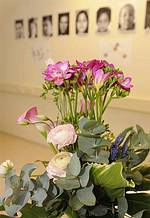Flowers Make You Feel Good
September 2009 - Dutch sensory and consumer research experts ascertain the psychological influences of cut flowers on people.
Using so-called “mood rooms”, researchers from Wageningen University’s Centre for Innovative Consumer Studies, a European Sensory Network member, have delved into the question whether and in what manner flowers influence people’s moods and perceptions. At the behest of the Dutch Horticultural Marketing Board, they examined how various flower arrangements are directly and indirectly perceived and what sorts of influences they exert on different people.
It is generally accepted that flowers have a positive influence on people. There are good reasons why people bring flowers to the sick in order to raise their spirits, or give them as gifts for special occasions, such as birthdays, anniversaries, and other celebrations. Flowers create a pleasant atmosphere not just in the home; they are also used in business environments to create a positive ambience. Up until now, however, there has been virtually no research into the positive affects of flowers.
Dutch researchers took up the challenge. Using a pretence in order to disguise the real purpose of the study, they invited 64 test subjects to a lunch. The subjects were divided into a total of four rooms. The rooms were identical except for the flower decorations. The behaviour of the test subjects was recorded by cameras. After the meal the project leader showed the test subjects photos and asked them to evaluate the characteristics of the people in the photos. This is an established technique that reliably tracks the emotional state of the person evaluating the photo.
A week later the participants came back for a second test. This time the subjects had to complete a memory test: among other things, they were asked to give their general impression of their experience at the first test session, and describe the test room’s features. They were also asked which flowers they thought worked best in particular situations and environs. Finally, 16 subjects were interviewed in depth. They were asked how they had perceived flowers in a variety of situations in which they had been aware that flowers were a part of the surroundings.
Influence on an unconcius level
The experiments showed that at an unconscious level, flowers have a positive influence on the way restaurant-goers perceive each other as well as how enjoyable they remember the restaurant experience to be. People are perceived to be more cheerful, warmer, more enjoyable and accessible in rooms with flower arrangements. They are also perceived as less arrogant, tense, egocentric, shy, suspicious, and moody than when encountered in a room without flowers. When they are in rooms with flowers, people have more of a feeling of well-being than when they are in rooms without flowers. Fresh, well-kept flowers in a restaurant give the impression that the proprietor is taking good care of his guests. However, badly cared-for, wilted flowers will cause the guest to question the restaurant’s quality. Project leader Dr. Jozina Mojet comments that, “Well-cared for vase flowers are an easy but effective way to improve a restaurant’s image.”
This also goes for such business environs as banks and hotel lobbies. It is not the case for train stations and airports which were judged by those questioned as “completely unsuitable for cut flower arrangements”, says the researcher.
Flowers have specific fits
Her conclusion: especially in business environments, it is important that the assortment of flowers be carefully chosen, since it has been shown that particular flower sorts have specific “fits”. For instance, it was found that white lilies and roses were deemed especially suitable as decoration for events in the church or at funerals, whereas large-petal cut vase flowers such as anthurium and cymbidium orchids were preferred for use in hotel lobbies.
The researchers explained that there are essentially three aspects that determine how flowers are perceived and what they mean to the viewer:
- the person perceiving the flowers
- the vase flowers (quality, type, etc.)
- the context or location in which the flowers are presented.
The researcher’s experience is that “End-users have individual backgrounds and at times very divergent tastes, and thus attach different values to vase flowers.” They recommend a marketing approach which is based on the identification and characterisation of various consumer types. Such a basic segmentation of end-user groups can serve as an ideal basis for the development of targeted product and marketing concepts.
Contact:
Dr. Jozina Mojet
Wageningen University and Research Centre
Centre for Innovative Consumer Studies
